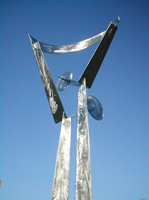
Bryn Mawr College

 |
Center Bryn Mawr College | 
|
February 20, 2003
Mark Lord (Theater)
"Tomomi's Dream: Embodying Our Disciplines"
After Tomomi's presentation, it seemed to Mark that we had reached a roadblock in our discussion of the disciplining of our bodies; he was hoping to re-open the discussion, by inviting us into the sort of exercise he uses with his student actors when a rehearsal is not going well. He invited us to explore our body awareness, by thinking/remembering/exploring/associating with the physicality of our experiences at work. Following an exercise designed by Stanislavsky, Mark guided us in a meditation in which we imagined ourselves working--both what it has been like recently and at a much earlier time, both when it is going well and when not. Noting that it would be "less helpful if we tried to steer it," Mark instructed us to "accept what comes," not to censor the associations that arose, thereby gathering some experiential data before turning our analytical minds to understanding the ways our disciplines have shaped our sense of physicality.
After the exercise, colleagues told some wonderful stories: a scientist described "being a monkey," a "little primate," wrapping one's feet around a chair in order to launch a sense of oneself "into the space" opened by a miscroscope, "losing a sense of body" as one is transported into the colors seen there. A humanist described the sense of "being a piece of bubble gum," suddenly blown up, exploding, being lifted out of one's chair, along with the computer in which words are combining, carrying one along as one struggles to keep up with the rapid flow. A social scientist described a sense of connection between the screen and the mind: when the head is in the computer, the "rest of it goes away." Other stories included being told "not to think" as a high-school runner (and of the pleasure that came with entering that state), and of being told by a student that one looked as though one were "having fun" lecturing, as though one were "dancing."
Merleau-Ponty's distinction between the "known" and "lived" body arose in our discussion of these experiences: if we are "living" in our body, perhaps we cannot "know" it; when we are less aware of our bodies, do we experience ourselves as disembodied? When the "alignment is right," is our experience one of being disembodied or more embodied? What are our experiences of the limits of embodiedness? Can the sense of dis-ease, of not being "at home" in one's body, only be seen from the outside? Do different cultural stances perceive different postures as odd? Do we have a sense of ourselves as being at odds with ourselves because we do not have the language to describe our experiences? Even Mark's instructions implied that our bodies were "possessions" to be manipulated. Does our language shape how and what we experience, or do we have experiences we can't find the words for? Is it useful to distinguish between two parts of the brain, and suggest that a sense of discomfort arises when they disagree about what is going on? (This would be a mind/mind, rather than a mind/body split.) Is the distinction between these two parts influenced by cultural factors?
Perhaps the problem involves the sorts of expressions we have available for talking about our bodily experiences: we use the language of pleasure and pain, as if our body were delivering a message to us. Perhaps a different language for describing the sense of movement or "flow" is required. Can we get away from the binaries of "known" and "lived" body, of being "aware" (or not) of our body, to a more "layered" description of our experiences? Can we get beyond the "trap" of having to choose? Is there another way to imagine, and to describe, being more conscious, having a known sense of the body? There is also the matter of learning skills--so that we can sink to the level of what the body knows and pull it up immediately when it is needed.
What is happening when one experiences a different kind of body, if one imagines oneself as another mammal, or as a skate? Is this a "biological memory of a time when we had gills"? A metaphorical rendition of what it feels like, psychologically, to be aware of one's body, to have a spine--or to be spineless? Does feeling good also involve how you imagine others imagining your body? Is there a split between the body you are trying to be and the one you are? Are successful moments defined by yourself, or read by others?
This conversation is invited to continue on the
On-Line Forum and resume "in the body" next Thursday at noon, when Doug Blank of the Bryn Mawr Computer Science Program will initiate a discussion about "Teaching Across the Genders." We hope you can join us then.
Home
| Calendar | About
| Getting Involved
| Groups | Initiatives | Bryn Mawr Home | Serendip Home
Director: Liz McCormack -
emccorma@brynmawr.edu
| Faculty Steering Committee
| Secretary: Lisa Kolonay
© 1994-
, by Center for Science in Society, Bryn Mawr College and Serendip
Last Modified:
Wednesday, 02-May-2018 11:57:05 CDT